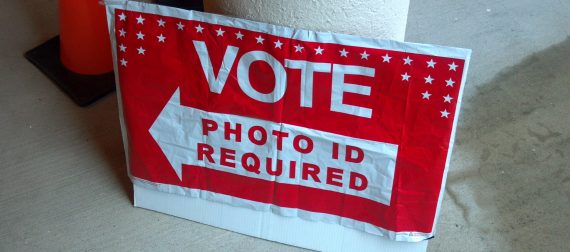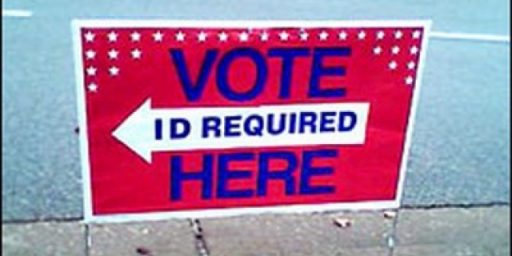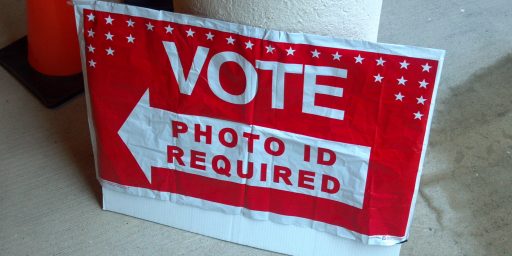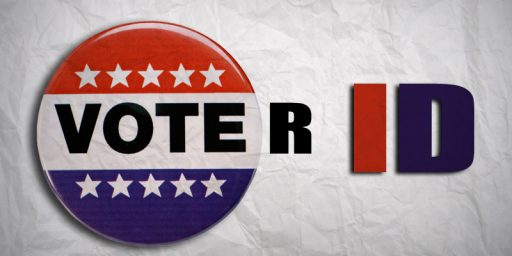Federal Court Rules Texas Voter ID Law Violates Voting Rights Act
A big setback for one of the most restrictive Voter ID Laws in the country.
The Fifth Circuit Court of Appeals has ruled that the Voter ID Law adopted by the State of Texas violates the Voting Rights Act and ruled that the state must modify the law to accommodate those people who face difficulties gaining access to the necessary documentation to obtain proper identification under the law:
HOUSTON — A federal appeals court on Wednesday ruled that Texas’ voter identification law, one of the strictest in the country, violated the Voting Rights Act and that the state must find ways to accommodate voters who face hardships in obtaining the necessary documents.
Democrats and voting rights advocates hailed the ruling as a significant victory in one of the nation’s most closely watched voting rights cases. It was the fourth time in nearly four years that a federal court found that the Texas law discriminated against or disproportionately affected black and Hispanic voters.
“The court got it right, recognizing the stink of discrimination,” said Trey Martinez Fischer, a state representative who is the chairman of the Mexican-American Legislative Caucus, one of several minority groups, voters and Democratic lawmakers who sued Texas over the law.
The United States Court of Appeals for the Fifth Circuit, in New Orleans, found that the law had a discriminatory effect on blacks and Latinos, who often lack the forms of identification required under the Texas law. But the ruling did not strike down the law entirely, ruling instead that new procedures must be found to assist potential voters lacking the required identification.
The ruling also sent back for reconsideration the question of whether Texas legislators had acted with a discriminatory purpose in passing the law in 2011, a finding that would have forced new judicial oversight of any changes in Texas election rules.
Gov. Greg Abbott, a Republican who defended the voter ID law against legal challenges when he was the state’s attorney general, said the court had come to the wrong conclusion. Republican lawmakers have long defended the law, saying it is needed to prevent voter fraud.
“Voter fraud is real, and it undermines the integrity of the election process,” Mr. Abbott said in a statement. “Texas will continue to make sure there is no illegal voting at the ballot box.”
Passed by the Republican-dominated Legislature and signed by Gov. Rick Perry in 2011, the law took effect in 2013. It requires voters to present one of several forms of government-issued identification, including a driver’s license, passport, military ID card or concealed-handgun license.
A lower court judge found that about 608,000 registered voters in Texas lacked the types of identification required by the law, and that a disproportionate number were black or Hispanic. The judge based that finding on testimony and data presented by experts during a 2014 trial in Corpus Christi. Texas’ lawyers disputed that figure.
In its ruling, the Fifth Circuit asked a lower court judge to come up with a remedy that “disrupts voter identification rules for the 2016 election season as little as possible, yet eliminates” the law’s discriminatory effect on minority voters. One possible solution, the court noted, would be to allow voter-registration cards to be used as identification. The court also instructed the judge to re-evaluate the evidence about whether the Texas Legislature intentionally discriminated against blacks and Hispanics, but encouraged the judge to wait until after the November election.
The Texas attorney general, Ken Paxton, said in a statement that the state had a duty to safeguard elections. “Preventing voter fraud is essential to accurately reflecting the will of Texas voters during elections, and it is unfortunate that this common-sense law, providing protections against fraud, was not upheld in its entirety,” Mr. Paxton said.
Asked if the state would appeal the decision to the Supreme Court, a spokeswoman for Mr. Paxton, Kayleigh Lovvorn, replied, “We are evaluating all of our options right now.”
This decision comes after an en banc review of a panel decision of three Fifth Circuit Judges in which a majority of the panel found that the Texas law violated Section Two of the Voting Rights Act, one of the first major rulings finding a violation under that provision of the law since the Supreme Court ruling several years ago that essentially vitiated the pre-clearance requirements of Section Four of the Act. In this case, a majority of the full Court agreed with the panel that the Texas law did indeed violate the Voting Rights Act due to the fact that it does not provide sufficient accommodations for poor and minority voters who may not have access to documents necessary to prove their identity in order to obtain the kind of identification defined as acceptable under the law. Fox example, due to the fact that many of the facilities where these documents can be obtained from are spread out over a vast area of the state, and traveling to obtain these documents is often next to impossible for people who may work two or three jobs to support their families. Additionally, and especially among the state’s Latino populations, births and other records are often not available to the elderly who were born at a time when such records were not kept with the rigor and accuracy that they are today. At the same time, as many critics have noted, the law also provides that forms of identification that the non-minority population is likely to have easy access to, such as concealed carry permits, are considered acceptable while other forms of identification, such as the voter registration cards that the state has issued to voters for decades, are not considered acceptable even though it is likely to be the one form of government-issued identification that people at all levels of society are likely to have access to. While the arguments and evidence reviewed by the Court in its 203 pages of opinions is complicated and not easily summarized, the one thing that is clear is that the disparate impact on minorities created by the fact that the law distinguishes between forms of identification that are considered acceptable and unacceptable is the fact that stands out the most for the majority both in this opinion and in the panel opinion that preceded it. As a result, the Court is saying that that law must be modified to reduce this impact as much as possible, although it’s important to note that it is not saying that the law is likely to be struck down because of it.
Elections and voting rights law expert Rick Hasen comments:
The bottom line is that the majority of the 5th Circuit has done what the panel opinion had originally held: there is a remand on the question whether Texas acted with a discriminatory purpose, but there is enough evidence of a discriminatory effect so as to render the Texas id law a Voting Rights Act violation.
BUT, and this is a big but, the remedy is NOT going to be to strike the Texas voter id law as a whole, but instead to fashion some kind of relief that give people who have a reasonable impediment to getting an id the chance to get one. This might be like the affidavit requirement just approved yesterday in the Wisconsin case, or something else (like an indigency exception affidavit). Further, given the timing of the election, the trial court has to craft some kind of interim relief and then can figure out a more comprehensive solution after the next election.
BUT, BUT there is a very strong dissent from the 5th Circuit’s most conservative members, and that might give Texas a reason to go to the Supreme Court to try to get this emergency interim relief stayed.
BUT, BUT BUT: the Supreme Court has now lost Justice Scalia, and at best Texas could hope for only 4 votes to reverse what the 5th Circuit has done. Indeed, I’m not sure that even Justice Kennedy/Chief Justice Roberts would be on board. If the court ties, the 5th circuit en banc decision stands.
In a subsequent piece for Slate, Hasen notes that the Fifth Circuit’s ruling could be an indication that the Voting Rights Act may be getting some of the enforcement powers back that were lost after the Supreme Court’s Shelby County decision and its aftermath. To a large degree, of course, whether that happens depends significantly on the outcome of the Presidential election and the future of the Supreme Court. As things stand right now, an appeal of this case to the Supreme Court right now would mean, at best, a 4-4 tie that results in this decision standing and Texas faced with the prospect of either having a reform to its Voter ID Law imposed upon it by a Federal District Judge, or the state legislature having to craft a remedy on its own that can both obtain majority support in that body, and support of the body, and satisfy the concerns addressed by the Judges in this opinion. At worst, it’s possible that an appeal to the Supreme Court could result in either Justice Kennedy or Chief Justice Roberts siding with the four liberal members of the Court in sustaining the Fifth Circuit ruling and perhaps even taking it further into territory that would result in the law being weakened significantly further. Because of that, it’s possible that Texas will decide to allow the case to be remanded back to District Court and fight its battle there for the time being until its clear what direction the Supreme Court might be headed in. In that regard, it’s clear that if Hillary Clinton is elected President the legal battles over the Voting Rights Act will take on a completely different tone and that even the Court’s recent ruling on Section Four of the Voting Rights Act could end up being re-examined in the future. Even the confirmation of Merrick Garland would likely shift the balance on this issue sufficiently to bring an end to the efforts of many Republican dominated states to change their voting and election laws in ways that end up disadvantaging Democrats by making it more difficult for poor and minority voters to vote or register to vote. Of course, if Donald Trump wins the election and he sticks to the promises he’s made to Republican regarding the types of Judges he would appoint, the opposite would likely occur and we’d likely see another increase in the types of reforms that have been coming out of Republican dominated states like Texas for much of the past five years or so.
Here’s the Court’s opinion:
Veasey Et Al v Abbott Et Al by Doug Mataconis on Scribd





Read the majority opinion yesterday. It was very much in line with SCOTUS’s recent approach in Whole Woman’s Health in that they weren’t going to allow the Texas Legislature to lie about their motivations when reality was so apparent. Facts and reality actually mattered – which was a nice surprise from the 5TH Circuit.
@SKI: Not even they could deny it.
So glad racism is over and that pesky Voting Rights Act is unnecessary…er, I mean, we need to discourage voter fraud by defrauding 600,000 voters in true Texan logic.
Read the dissent (if you can stomach it). Wow.
Judge Edith Jones compared those who see racism from Republicans as a motive to enact laws that purposely discriminate against minorities to those who see government conspiracy at Area 51.
Yes, Judge Jones, it is just like that.
Idiot.
I hope that this is not some end run effort by this judge to give voting rights to people who are not legal US citizens.
I talked to a lady a few years ago who said she found out her mother had voted in the last 4 elections. Her mother had died about 8 years earlier !
“Vote early, and often”
@Tyrell:
Actually, that was part of the Majority’s (and the District Court’s) point about the legislation – not only that it did nothing to address an area where there actually is some evidence of fraud – the elderly and mail-in voting – but it actually made the issue worse by forcing the elderly without the “proper ID” to vote by mail (as that ID isn’t required to vote by mail).
@Tyrell:
They also addressed this as some of the forms of IDs that were ok were available to non-US citizens.
This is a very big decision. Hopefully, it’s a start of the general roll-back for voter suppression laws.
The numbers proposed by the people who made these laws never added up.
1) It was like using a nuke to swat an ant (even a non-existent one).
2) The necessary work to mitigate the extra burden on voters was never followed through.
Cost-benefit analysis was not their strong suit.
I think Charles Pierce’s analysis is great: http://www.esquire.com/news-politics/politics/news/a46892/texas-voter-id-ruling/
Hooold on a second.
Every job I had required some serious ID. You know, the INS’ “One form each from Column A & Column B” or “One from Column C”. Are you seriously telling me that someone with enough ID to get three jobs doesn’t have have sufficient ID to vote?
@John D’Geek:
I’m guessing you never cleaned other people’s toilets for a living? Not much of a documentation requirement for that one, or most other menial service jobs.
Wow, if this couldn’t even pass muster from the notoriously conservative 5th Circuit court then there’s really no point in trying it at the Supremes.
@Argon:
Untrue. The Republican TX legislators analyzed this closely and saw that it would, on net, take votes away from any potential Dem opponent while costing the legislators personally nothing.
@John D’Geek: And in some cases, the problem is not having ID, it’s having to stand in line for 4 hours somewhere to get this specific piece of ID. Where I lived in Oregon, the DMV was almost an hour away and was open from 9 am to 4 pm. My teaching job ran from 7am to 3:30 pm, and on the leave day I took to change my license, the school principal told me that I probably wouldn’t be able to get back in time to cover my afternoon classes even arriving at 9 am. Turned out he was right (and the changeover/temp license process only took 15 minutes).
Imagine what it’s like for a worker who has to both lose the money (for being off the job) and risk getting replaced (for needing to be off the job).
saying “You should have enough ID to vote, quit whining” sounds way better than “this is obviously a racist move to steal elections, but frankly i’m racist enough to not care.”
Know why the GOP doesn’t even care that their refusal to confirm Garland is sleazy and unprecedented? Cuz they know the ass-whooping is coming, and they’re delaying the reckoning.
The spring and summer of the next 5 years, as decision after decision of the new moderate-to-liberal SCOTUS is handed down concerning voting rights, gun rights, polluting, etc, are going to provoke more conservative butthurt that I’ve ever witnessed.
@John D’Geek:
24th amendment:
The right of citizens of the United States to vote in any primary or other election for President or Vice President, for electors for President or Vice President, or for Senator or Representative in Congress, shall not be denied or abridged by the United States or any State by reason of failure to pay any poll tax or other tax.
The Supreme Court should have ruled that voter ID laws were unconstitutional on that basis.
I would not mind having a voter ID law if the IDs were free. But they aren’t.
In any case, if one is intent on committing voter fraud, then this is how you would do it:
http://www.sltrib.com/news/4120393-155/state-says-wayne-county-deputy-clerk
A GOP primary candidate in a Utah election is claiming that the winner stole the election. Elements:
-Winner’s wife is the deputy county clerk of that same county
-She allegedly used her position to encourage some voters to vote for her husband
-She allegedly removed some voters from GOP party roles (presumably so that they could not vote)
-She allegedly used her authority as deputy county clerk to not count some votes cast by mail
This is how voter fraud really works. The most effective tool for stealing an election is to NOT count votes, not to create fake voters. A useful supplement is using a position of authority to change minds.
The power to steal an election is held by those who count the votes, not by some individual poor grunt whose single vote comprises only a tiny fraction of the total votes cast.
The real fraud is in denying the vote to those who are entitled have it. Insult is added to injury by assessing what is essentially a poll tax in order to deny that vote to them.